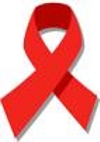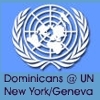| HIV/AIDS
In 2000, the Dominican Family in Africa asked
Justice Promoters in North America to focus on the AIDS pandemic
and its impact on all of life on the continent. The Dominicans at
the United Nations join that work.
The AIDS pandemic continues to “carve out a hole in the heart
of humanity.” Nearly 40 million women, men and children are
living with the HIV virus in 2006 – 2.6 million more than
in 2004. And despite the many efforts to halt this devastating virus,
more than 4 million adults and children were newly infected in 2006,
which means that more than 11,000 people become infected each day
worldwide.
 Women and youth are the two hardest hit segments of the population
in many regions of the world. Women in sub-Saharan Africa are more
likely than men to be infected with HIV, but they also are the primary
caregivers for those already living with the virus. Many of these
new infections among women are a direct result of sexual violence
perpetrated by marauding military or armed groups in countries experiencing
civil unrest – the systematic rape of women in Darfur, Sudan,
eastern Congo (Democratic Republic of Congo) and Liberia.
Women and youth are the two hardest hit segments of the population
in many regions of the world. Women in sub-Saharan Africa are more
likely than men to be infected with HIV, but they also are the primary
caregivers for those already living with the virus. Many of these
new infections among women are a direct result of sexual violence
perpetrated by marauding military or armed groups in countries experiencing
civil unrest – the systematic rape of women in Darfur, Sudan,
eastern Congo (Democratic Republic of Congo) and Liberia.
There are now more than 530,000 children who are infected with HIV.
More than 380,000 children died in 2006 as a result of AIDS-related
complications. Most of the children who are living with HIV are
in resource-poor regions of the world and do not have access to
life-extending antiretroviral drugs. Many of these children will
die by the age of two.
The response of the world to this pandemic has been grossly insufficient.
It is now estimated that more than $20 billion (USD) is required
to help prevent new infections, provide treatment and care to those
living with HIV, strengthen national health care systems and locally-based
health care delivery systems, fight the stigma of AIDS and provide
support to families and communities disproportionately affected
by the pandemic.
NGO Committee on HIV/AIDS
Mission
The NGO Committee on HIV/AIDS addresses policy within the UN system
of the HIV/AIDS pandemic by advocating for global action related
to the epidemic, strengthening and supporting an expanded response
for the prevention of transmission of HIV; the provision of care
and support; reducing the vulnerability of individuals and communities
to HIV/AIDS including the social stigma associated with the disease;
and alleviating the impact of the epidemic.
Activities
• Monthly meetings
• Influence policy decisions of the Joint United Nations Program
on HIV/AIDS
• Review the work of ECOSOC and various UN Commissions from
the perspective of integrating issues related to HIV/AIDS
• Seek an integrated approach to the work of NGOs and to supplement
the activities of existing Committees of the Conference on NGOs
in Consultative status with ECOSOC
|
|


